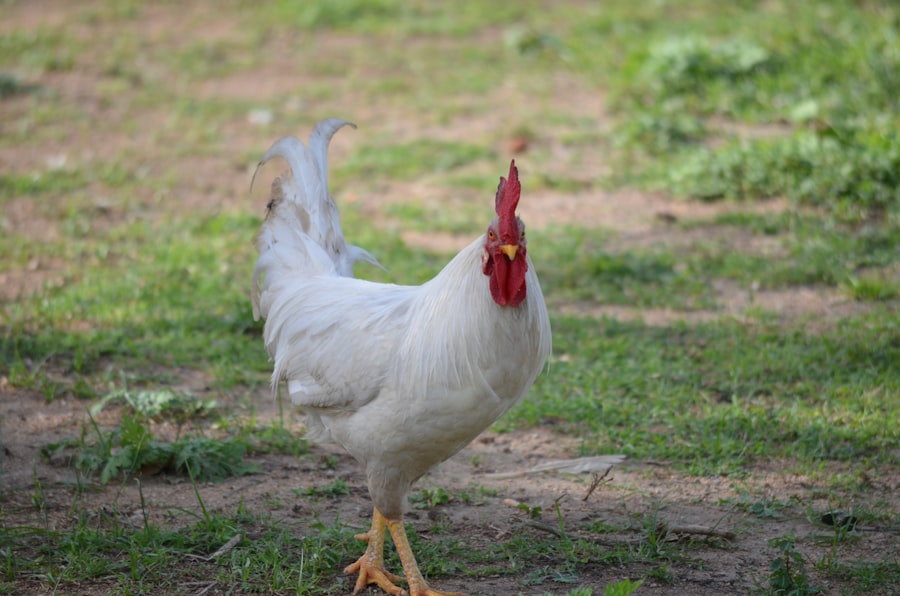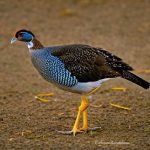Guinea fowl, also known as pintades, are a type of game bird native to the African continent. They are closely related to other game birds such as pheasants and turkeys, and are known for their distinctive appearance and loud, raucous calls. Guinea fowl are popular for their meat, eggs, and pest control abilities, making them a valuable addition to many farms and homesteads around the world.
Guinea fowl are medium-sized birds with a round body, small head, and short, sturdy legs. They have a distinctive appearance, with speckled feathers in shades of gray, white, and black. Their heads are adorned with a small, helmet-like crest, and they have a bare patch of skin around their eyes and beak. Guinea fowl are known for their loud calls, which can be heard from a great distance. They are social birds that prefer to live in flocks, and they are highly adaptable to a variety of climates and environments. Guinea fowl are also known for their keen sense of alertness and their ability to detect potential threats, making them excellent natural pest controllers.
Key Takeaways
- Guinea fowl are domesticated birds known for their pest control abilities and snake predation.
- They are natural pest controllers, feeding on insects, ticks, and other pests in the garden and around the property.
- Guinea fowl are effective at keeping snakes away due to their loud calls and aggressive behavior towards potential predators.
- Using guinea fowl for snake control can reduce the risk of snake encounters and provide a natural, chemical-free pest control solution.
- When introducing guinea fowl to your property, provide a secure coop, gradually acclimate them to the area, and monitor their interactions with other animals.
Guinea Fowl as Natural Pest Control
Guinea fowl are highly effective natural pest controllers, and they are often used to control insect populations on farms and in gardens. These birds have a voracious appetite for insects such as ticks, grasshoppers, beetles, and even small rodents. They are also known to eat weed seeds, making them valuable allies in the fight against unwanted plant growth. Guinea fowl are particularly effective at controlling tick populations, which can carry diseases such as Lyme disease and Rocky Mountain spotted fever.
In addition to their insect-eating abilities, guinea fowl are also known for their keen sense of alertness and their ability to detect potential threats. They are highly vocal birds that will sound the alarm at the first sign of danger, making them excellent watchdogs for farms and homesteads. Their loud calls can alert farmers to the presence of predators such as foxes, coyotes, and even snakes. This makes guinea fowl an invaluable asset for protecting livestock and crops from potential harm.
Guinea Fowl and Snake Predation
One of the most valuable benefits of using guinea fowl on a property is their ability to control snake populations. Snakes can pose a significant threat to both humans and animals, as many species are venomous and can cause serious harm if encountered. In addition to their venomous nature, snakes can also prey on small livestock such as chickens and ducks, making them a concern for many farmers and homesteaders.
Guinea fowl are known for their natural aversion to snakes, and they will actively seek out and attack any snakes that they encounter. This behavior makes them highly effective at keeping snake populations in check, reducing the risk of encounters with venomous species. In addition to their aggressive behavior towards snakes, guinea fowl also have a keen sense of alertness that allows them to detect the presence of snakes before they become a threat.
How Guinea Fowl Keep Snakes Away
Guinea fowl have several strategies for keeping snakes away from their territory. One of the most effective methods is their aggressive behavior towards snakes. When guinea fowl encounter a snake, they will often gather together and attack it as a group, using their sharp beaks and strong legs to peck and kick at the snake until it retreats or is killed. This behavior is highly effective at deterring snakes from entering the area, as they quickly learn to avoid areas where guinea fowl are present.
In addition to their aggressive behavior, guinea fowl also have a keen sense of alertness that allows them to detect the presence of snakes before they become a threat. Guinea fowl are highly vocal birds that will sound the alarm at the first sign of danger, alerting other members of the flock and potentially scaring off the snake before it can cause harm. This combination of aggressive behavior and keen alertness makes guinea fowl highly effective at keeping snake populations in check and reducing the risk of encounters with venomous species.
Benefits of Using Guinea Fowl for Snake Control
There are numerous benefits to using guinea fowl for snake control on a property. One of the most significant benefits is the reduction in the risk of encounters with venomous snakes. Many species of snakes can pose a serious threat to humans and animals, and encounters with venomous species can result in serious injury or even death. By keeping snake populations in check, guinea fowl can significantly reduce the risk of encounters with venomous snakes, making the property safer for both humans and animals.
In addition to reducing the risk of encounters with venomous snakes, guinea fowl can also help protect small livestock such as chickens and ducks from predation. Snakes are known to prey on small animals, and they can pose a significant threat to poultry populations on farms and homesteads. By actively seeking out and attacking snakes, guinea fowl can help protect small livestock from predation, reducing the risk of losses due to snake encounters.
Tips for Introducing Guinea Fowl to Your Property

Introducing guinea fowl to your property can be a rewarding experience, but it is important to take certain steps to ensure their successful integration into your farm or homestead. One important consideration is providing adequate shelter for your guinea fowl. Guinea fowl prefer to roost in trees or other elevated structures at night, so it is important to provide them with suitable roosting spots to keep them safe from predators such as foxes and coyotes.
Another important consideration is providing adequate food and water for your guinea fowl. Guinea fowl are omnivorous birds that eat a variety of foods including insects, seeds, and small plants. It is important to provide them with access to a diverse range of foods to ensure they receive proper nutrition. Additionally, guinea fowl require access to clean water at all times, so it is important to provide them with a reliable source of fresh water.
Conclusion and Considerations for Using Guinea Fowl for Snake Control
In conclusion, guinea fowl are highly effective natural pest controllers that can provide numerous benefits for farms and homesteads. Their ability to control insect populations, protect small livestock, and keep snake populations in check makes them a valuable addition to any property. When introducing guinea fowl to your property, it is important to provide them with adequate shelter, food, and water to ensure their successful integration into your farm or homestead.
Using guinea fowl for snake control can significantly reduce the risk of encounters with venomous snakes and help protect small livestock from predation. Their aggressive behavior towards snakes and keen sense of alertness make them highly effective at deterring snakes from entering the area. By taking the necessary steps to introduce guinea fowl to your property, you can enjoy the numerous benefits they provide while helping to keep your property safe from potential threats.
Sure, here’s a paragraph that includes a related article to guinea fowl keeping snakes away:
“Guinea fowl are known for their ability to keep snakes away from your property, making them a valuable addition to any poultry flock. According to a study published in the Poultry Wizard, guinea fowl have a natural instinct to alert and deter snakes, making them an effective form of pest control. This makes them an excellent choice for those looking to protect their chickens and other small animals from potential snake threats. Additionally, their loud calls and vigilant nature make them an excellent alarm system for any backyard or farm.”
FAQs
What are guinea fowl?
Guinea fowl are a type of bird native to Africa. They are known for their distinctive spotted feathers and loud, chattering calls.
Do guinea fowl keep snakes away?
Yes, guinea fowl are known for their ability to keep snakes away from an area. They are natural predators of snakes and will actively hunt and kill them.
How do guinea fowl keep snakes away?
Guinea fowl are vigilant and vocal birds that will sound the alarm when they spot a snake. They will then work together to mob and attack the snake, often killing it in the process.
Are guinea fowl effective at keeping snakes away?
Yes, guinea fowl are considered to be effective at keeping snakes away from an area. Many farmers and homeowners use guinea fowl specifically for this purpose.
Are there any downsides to using guinea fowl to keep snakes away?
While guinea fowl are effective at keeping snakes away, they can be noisy and may not be suitable for all environments. Additionally, they may also eat beneficial insects and plants in the area.
Meet Walter, the feathered-friend fanatic of Florida! Nestled in the sunshine state, Walter struts through life with his feathered companions, clucking his way to happiness. With a coop that’s fancier than a five-star hotel, he’s the Don Juan of the chicken world. When he’s not teaching his hens to do the cha-cha, you’ll find him in a heated debate with his prized rooster, Sir Clucks-a-Lot. Walter’s poultry passion is no yolk; he’s the sunny-side-up guy you never knew you needed in your flock of friends!







